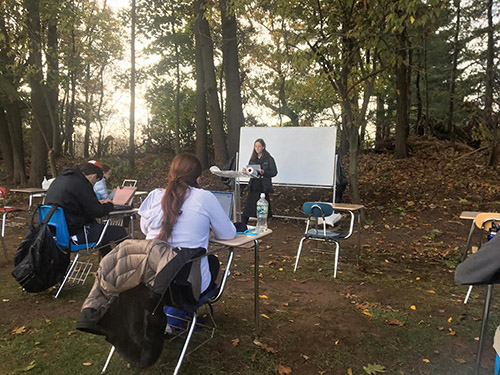


Yeshivat Frisch’s Judaic Studies classes offer numerous, unique opportunities to delve deeply into religious, cultural and historical topics. Last week was no exception. Yael Goldfischer’s Chumash classes had a “Kayin and Hevel walk-through.” Each student chose one artistic rendition of the Cain and Abel story from Bereishit and then analyzed the artist’s faithfulness to the text and interpretive goals, and found one Jewish commentary as support for the approach. Each student then presented their chosen artwork and explained it to a small group of peers. Afterwards, students reflected how the various artworks reflected different readings and incorporated new and differing interpretations of the biblical text. As a class they discussed the benefits and drawbacks of porting a biblical narrative in art. For instance, art is a powerful and vivid way to convey ideas—it creates a lasting impression—but in so doing it can at times leave out some of the ambiguity inherent within the text.
Meanwhile, in Shoshana Chanales’s senior elective on “Challenging Texts,” the class conducted a Socratic seminar on the topic of the commandment to destroy Amalek. Prior to the seminar, they prepared sources and formulated ideas on the topic, utilizing sources from the Gemara, commentaries such as those by Rashi and Abarbanel, as well as modern articles by Rabbi Norman Lamm, Rav Elchanan Samet and Professors Avi Sagi and Hanan Kasher.
One class even had the opportunity to hear a full shiur by a peer last week. In Rachel Besser’s junior Nach class, Brooke Kohl had a question on Tuesday about the age that levi’im were chosen to be in charge of the work in the Beit Hamikdash during the Second Temple period. Kohl raised the issue that in Bamidbar the levi’im were appointed from age 25 or 30, while in Sefer Ezra they were appointed at age 20. Besser encouraged her to look into the topic and check if the commentaries say anything about it. Kohl went on to thoroughly research the topic, and put together a source sheet with sources from all over Tanach, various commentators and Gemaras that dealt with this question and proposed different approaches to answering it. Kohl’s research ended up shedding light on the time period of Shivat Tzion that the class was learning about, and she presented her findings to the class on Friday with a fascinating shiur complete with a two page source sheet.










